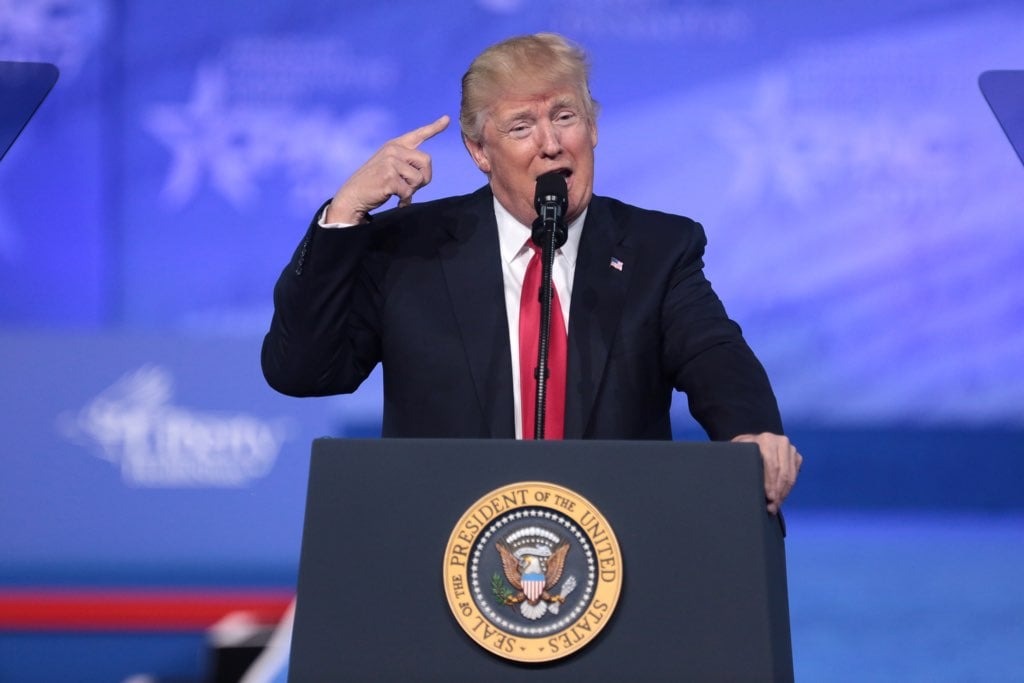President Trump used his commencement address at the US Coast Guard Academy to declare that he is the most maligned political leader in recorded civilization.
“No politician in history and I say this with great surety—has been treated worse or more unfairly,” Trump told the class of newly minted ensigns on a sunny day in New London, Connecticut.
The line jumped out from Trump’s speech, not because it’s a new complaint—Trump can usually be found griping in interviews and on Twitter—but because of the venue. Was this really the right place to complain about his feelings?
It’s tempting, and fun, to catalog Trump’s feeling constantly attacked as part of a pattern of fragile, childlike behavior alongside other reports about the President, such as aides wedging his name into memos as frequently as possible in order to keep him focused. Aaron James, a philosophy professor at the University of California, Irvine, has a different theory that seems more relevant in light of Trump’s grandstanding at the Coast Guard Academy.
“It’s one more way of being an asshole,” says James, whose 2012 book, Assholes: A Theory, and its 2016 follow-up, Assholes: A Theory of Donald Trump, make him something of an expert on the anatomical insult.
“The asshole acts out of a firm sense that he is special, that normal rules of conduct do not apply to him,” James writes in his 2012 volume. “Indeed he will often himself feel indignant when questions about his conduct are raised. That, from, his point of view, may show he is not getting the respect he deserves.”
That description could apply to Trump’s business career as much as his political experience—indeed, in his 2012 book James cited Trump as a public figure widely considered to be an asshole—but since becoming President, Trump has emerged as a different sort of asshole in whom grandiosity and insecurity are constantly clashing, James says.
“I think you can have a kind of asshole who’s supremely smug and not necessarily vulnerable to the misunderstandings of other people,” he says. “Trump has in this weird way this ego and fragility. His sense of self-worth collapses so quickly. Then he has to reinforce conceptions of his greatness, and that puts him in this struggle to rationalize why he’s being treated so unfairly.“
There’s been no shortage of examples of this behavior recently, as Trump barreled past a first 100 days relatively light on accomplishments into a full-blown crisis over his firing of FBI Director James Comey. He insists all unflattering coverage of his administration is “fake news” or “fake media,” taunts the losers of congressional races, and passes out maps showing county-by-county results of last year’s election as if to suggest he won the popular vote (which he lost by nearly 3 million).
But it’s Trump’s frequent victim act that has James thinking that Trump will go down as more of a dunce than a successful autocrat. The decision to fire Comey, James says, was “dictatorial in the sense that he fires at will.” But with the emergence of Comey’s memorandum about his meeting with Trump, the White House’s reported assumption that Comey’s dismissal would be quickly smoothed over, and Trump’s publicly aired threat that he had taped his conversations with the former FBI chief, it’s looking more and more like a Wile E. Coyote scheme.
“He’s completely out of touch with the moment, just living in his constructed world of grievance,” James says.
However, James adds, the theory of Trump-as-asshole works for both the President’s detractors and supporters. The “haters and losers”—as Trump has sometimes referred to his critics—may be enthused by recent evidence, including a Quinnipiac University poll released last week in which “asshole” was one of the top results when respondents were asked to describe him with one word. But a significant chunk of his supporters latched on to him because they accepted a narrative that it would take someone of Trump’s reputation to correct the federal government, a phenomenon James compares to Thomas Hobbes’s theory that absolute monarchs were needed to prevent the naturally chaotic people of 17th-century Europe from plunging into eternal civil war.
“In a system chock-full of assholes, you need an even bigger asshole to bring them to order,” is how James describes that belief in Trump. “That’s not really panning out.”



















